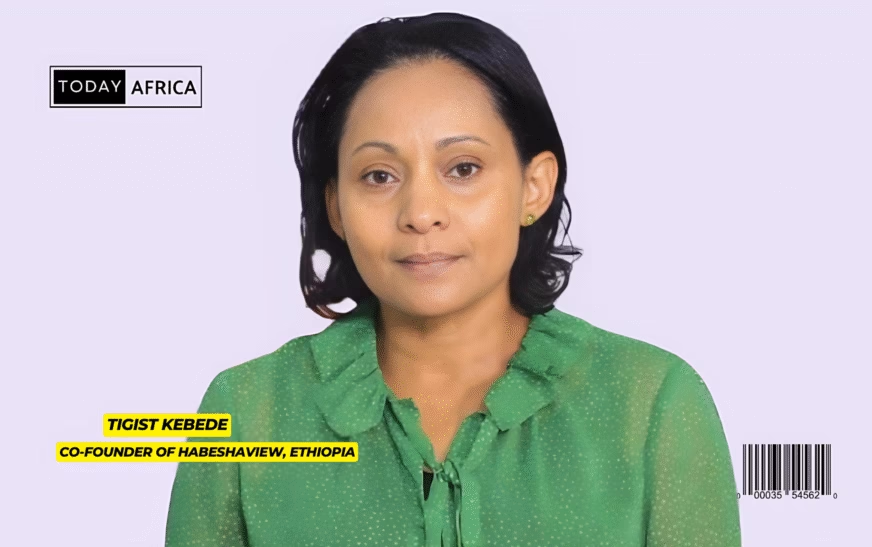In a world where global streaming platforms dominate our screens, one Ethiopian platform has quietly been rewriting the script, telling Africa’s stories through its own lens.
At the heart of this journey is Tigist Kebede, co-founder/operations director of Habeshaview, whose story is as inspiring as the films her platform promotes.
From teaching and law to entrepreneurship, Tigist’s mission is clear: to reshape how the world sees Ethiopia, not through the lens of outdated stereotypes, but through original stories told by Ethiopians themselves.
In this interview with Today Africa, Tigist Kebede opens up about the inspiration and challenges of building a streaming platform from scratch, the cultural power of storytelling, and why she believes Africa must own its narrative.
Tell us more about yourself
When Tigist Kebede speaks about habeshaview, her voice carries the calm conviction of someone who’s walked the long road from idea to impact.
“My name is Tigist Kebede,” she begins, “co-founder and Operations Director for habeshaview TV.”
The streaming platform, now celebrating its 10th anniversary, was born not from Silicon Valley funding or a corporate incubator, but from the quiet determination of an Ethiopian woman who had lived across continents and wanted to bring her culture with her wherever she went.
Before habeshaview, Tigist’s life was already layered with many chapters: a background in teaching and law, years of volunteering, and the delicate balance of raising a family while living abroad.
Each role, she says, shaped her perspective. But none would prepare her more for the journey of building a global streaming platform rooted in the Ethiopian diaspora experience.
What’s the inspiration behind starting habeshaview?
Tigist’s story begins not in one country but across fifty. She’s lived in ten of them, raising her family as she moved, often between cultures that did not reflect her own.
“While traveling,” she recalls, “I was very aware that there was very limited content specifically targeted to the market I’m looking at. If I was looking to watch an Ethiopian film, the availability was very limited.”
That realization turned into a question: where could Ethiopians abroad find stories that reflected who they were?
15 years ago, she and two friends, fellow Ethiopians in the diaspora, began to search for high-quality Ethiopian films: educational, entertaining, historical.
“We were not able to find any,” she says. So the three of them decided to build what didn’t exist.
At first, it was “more of a volunteering aspect,” Tigist remembers. “We invested and had the application built. For the first three years, we actually provided the service for free.”
Only later, when the audience grew and they needed to pay creatives and fund new productions, did habeshaview turn into a business.
This year marks ten years since its launch, a milestone she doesn’t take lightly.
“We are organizing ten different events throughout the year to mark that milestone,” she says, pride flickering in her tone. “Because it’s not easy to be running a business starting from a small one and to celebrate ten years.”

What’s the inspiration behind the name habeshaview?
“There is sort of a history in Ethiopia that we like to name things with international names,” she says. “And this actually irritates me.”
For her, identity mattered. “I was one of the people who insisted that we have an Ethiopian touch name.”
Habesha means Ethiopian. View means to look at. Simple, direct, and deeply symbolic.
“We wanted it to sound Ethiopian because we are currently serving the Ethiopian community, those at home in Ethiopia and globally.”
It wasn’t just a brand decision; it was a statement. Habeshaview would carry the Ethiopian name proudly across borders.
“Habesha, Ethiopians are watching,” Tigist says, smiling at the literal translation.
See Also – How Alfi Oloo Broke into Product Design Without a Degree
What does it mean to put Ethiopian stories on the global stage?
When asked this, Tigist’s entire tone shifts; this, she says, is her passion question.
“If you think about Ethiopia,” she begins, “it’s the second largest population in Africa. We have a very long history of storytelling—stories that were told verbally, not necessarily written.”
These oral traditions, she explains, carry deep cultural roots. Yet much of the world only remembers Ethiopia through the lens of the past, images from 40 years ago, of famine and struggle.
“Some people don’t move away from that image and assume Ethiopia in 2025 is what they saw then.”
Through habeshaview, Tigist wants to change that narrative. “We have powerful, strong, and original stories that can be told and made into blockbusters,” she says.
Her platform, she adds, doesn’t just distribute films; it introduces audiences to a language, a culture, and a country.
“To get to film festivals, to showcase Ethiopian content internationally means not only storytelling, but also the introduction of the culture and the language.”
How do you decide on original content to produce, license, or distribute?
“In many ways, it’s easy for us,” Tigist admits, “because not a huge amount of films are produced in Ethiopia.”
Despite being one of the oldest film industries on the continent, Ethiopia’s production scale lags far behind giants like Nigeria.
“My colleagues in Nigeria laugh at me, saying they’re bringing out a hundred films a week,” she says, amused. “We’re still at the stage of turning out low-budget films.”
Without external producers or investors, Ethiopian filmmakers often self-finance, creating a small pool of new releases each year.
“At the moment, we’re getting potentially one a month, a very good film being produced.”
That scarcity means habeshaview has to get involved early. “We start discussing with the creatives at script level,” Tigist explains. “Initially we used to only license after it was finished. Now we’re co-producing or advising on how the film should be made.”
Global appeal is key. Subtitles, production quality, and storytelling all matter.
“Sometimes our stories tend to be focused on a smaller market,” she says. “But we’re helping them make it global.”
What is the difference between producing and licensing movies?
“When we are licensing,” Tigist says, “it’s somebody else who’s produced the content and we’re taking it up for a period, six months, two years.”
Producing, however, is more personal. “We’re involved in either advisory, financing, or actually working with the creatives to finish the project.”
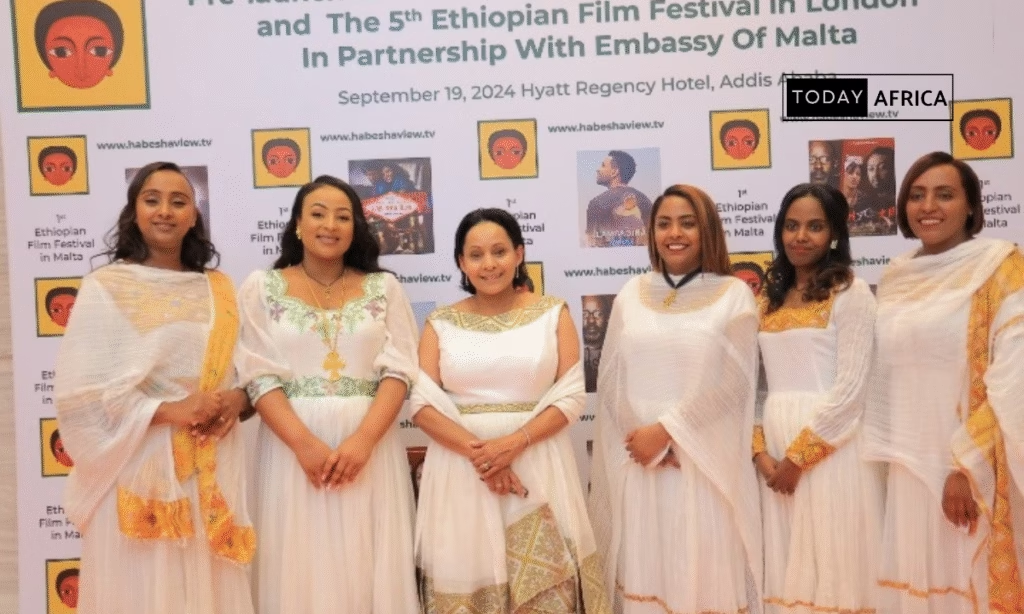
Beyond streaming, habeshaview also plays a crucial role as an international distributor.
“We distribute Ethiopian films to global streaming platforms, in-flight entertainment, theatrical releases,” Tigist says. “We’re trying to push Ethiopian content to the international market.”
Read Also – Why Dr. Gozie Ezeh Started ‘SweetMom’ to Support First-time Mothers in Nigeria
How did you raise capital to start and run habeshaview for three years for free?
“We were very fortunate,” Tigist says with quiet honesty.
The three co-founders, all Ethiopians living abroad, pooled their own resources.
“The three of us raised that money out of our own pockets,” she says. “We didn’t go fundraising.”
Their first app was basic, far from today’s sleek design. “Ten years ago, it only did VODs; it didn’t do live streams, audio, or all the brilliant things we have now.”
They bought Ethiopian films outright, paying filmmakers fairly, and offered the service for free for three years. “That showed us there was a market,” she recalls.
Later, when it was time to upgrade and monetize, two additional investors joined. “We were lucky and fortunate,” Tigist says. “We didn’t have to go to outside fundraising sources.”
But monetization in Ethiopia wasn’t easy.
“Before 2019, people didn’t have debit or credit cards,” she explains. “We had to block Ethiopia for quite a long time until we could get paid for the services we provided.”
What challenges have you faced in bringing Ethiopian content to the global stage?
“The first challenge,” Tigist says, “is that we’re not producing enough content.”
Funding gaps, limited producers, and lack of investment mean Ethiopia can’t compete with Asia or West Africa’s film industries.
“But our problem is not talent,” she insists. “We have amazing filmmakers, we just need to support them.”
Then there’s the issue of perception. “There is a misconception that Ethiopian films are still at an infant stage,” she says. “We submit films to international festivals every year. Sometimes they don’t get selected, not because they’re not good, but because juries aren’t familiar with our kind of storytelling.”
To bridge that gap, habeshaview created the Ethiopian Film Festival in London, and later in Malta and Washington D.C., to expose local filmmakers to global standards.
That exposure, she says, is transformative. “They come back and say, ‘We now need to make films this way.’”
Tigist’s favorite example is “Hirut,” a romantic Ethiopian film from 1965. “We were the first company to take it outside Ethiopia to London,” she says proudly. “It was a sold-out event.”
Are there filmmakers who surprised you the most?
“Yes,” Tigist says, smiling. “Our young creatives are experimenting.”
Traditionally, Ethiopian cinema leaned toward drama and romance, but now new genres are emerging. “We’re seeing horror, animation, and films based on true events,” she says.
One filmmaker impressed her deeply, a young man who made a horror film around the theme of split personality.
“It’s interesting because you can see it from the religious aspect as well as the modern side of double personality.”
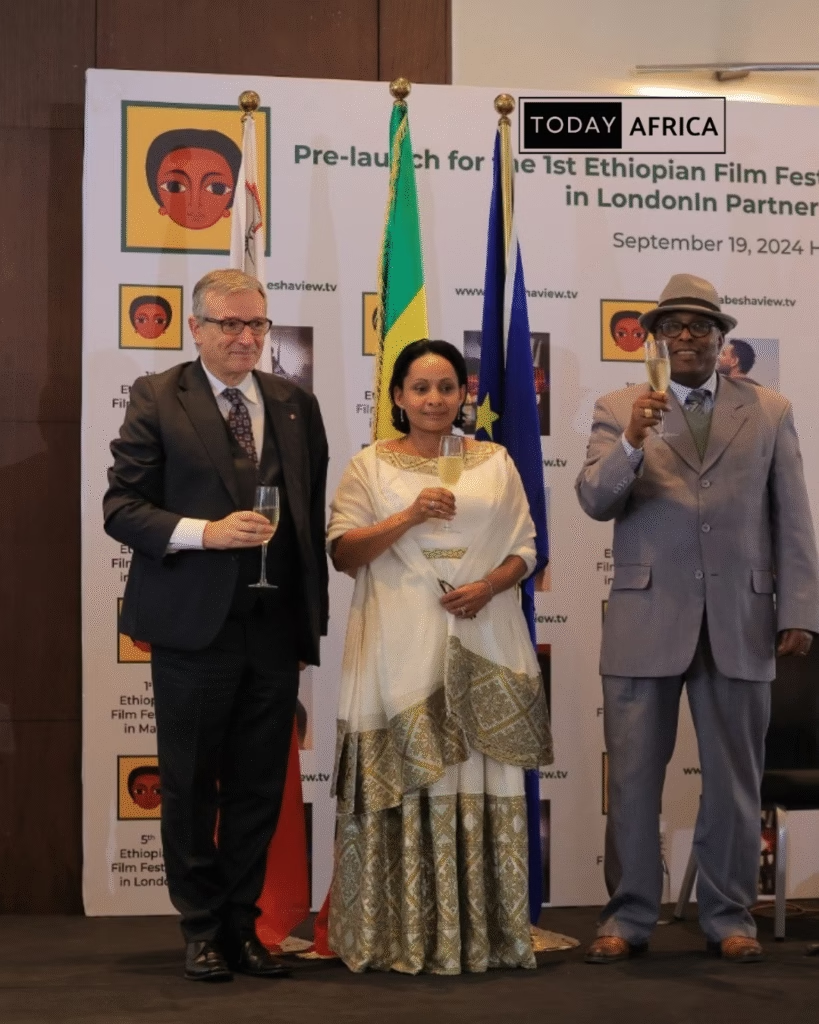
Then there are filmmakers telling their own stories—painful ones about migration or domestic violence.
“People are telling their own stories as a way of educating others,” she says, “but also as a way of relieving themselves.”
See Also – Nonhlanhla Shembe on Why “Visibility is Currency” for Small Businesses
What have been the most sustainable revenue streams in your business?
“Internationally, subscriptions work,” Tigist explains. “People are used to paying for content.”
But in Ethiopia, and Africa generally, the mindset is different.
“There’s a feeling of not wanting to pay because there’s so much free content,” she says.
That’s something she wants to change. “If we want the film industry to grow in Africa, we have to pay for content. Paying to watch is a responsibility.”
Habeshaview introduced flexible payment options, daily or pay-per-view, to make it easier. “We’re pleased to see people getting used to it,” she says.
Their revenue now comes from multiple streams: telecom partnerships, airlines, hotels, and brand collaborations.
“Surviving ten years means partners are coming to us,” she says. “But we have to be careful who we choose.”
How do you ensure these new monetization strategies meet evolving needs?
“The plan for the next five to ten years,” Tigist says, “is to have full production in-house.”
That would make habeshaview self-sufficient, capable of producing faster and cheaper without compromising quality.
They’re also expanding beyond Ethiopia, acquiring content from Sudan, Kenya, and Nigeria.
“The library has to grow,” she says. “Subscribers have huge choices; we must keep up.”
For Tigist, it’s a delicate balance: “We must provide content people are happy to pay for, and ensure filmmakers are paid fairly.”
How do you balance paying creatives fairly and keeping the platform affordable?
“We charge differently,” Tigist says. “Internationally, from $3.99 to $15.99, but in Ethiopia, around 75 Birr, about 75 cents.”
When habeshaview began, they bought full rights to films. Now, she’s educating filmmakers to retain their intellectual property.
“You should always keep the IP of your film,” she tells them. “Don’t just hand it over.”
Some deals still require full rights, but most are revenue shares or minimum guarantees. “It doesn’t work for everyone, so we tailor it,” she says.
Read Also – Hortense Mbea: Building Afropian to Celebrate African Heritage Through Fashion
What is the role of habeshaview in preserving Ethiopia’s cultural heritage?
Tigist smiles. “That’s a million-dollar question.”
Films, she says, are a country’s best ambassadors.
“Even if you’ve never been to New York, you feel like you know it because of the films. The same should be true for Ethiopia.”
By showcasing Ethiopian landscapes, traditions, and languages, habeshaview invites the world in.
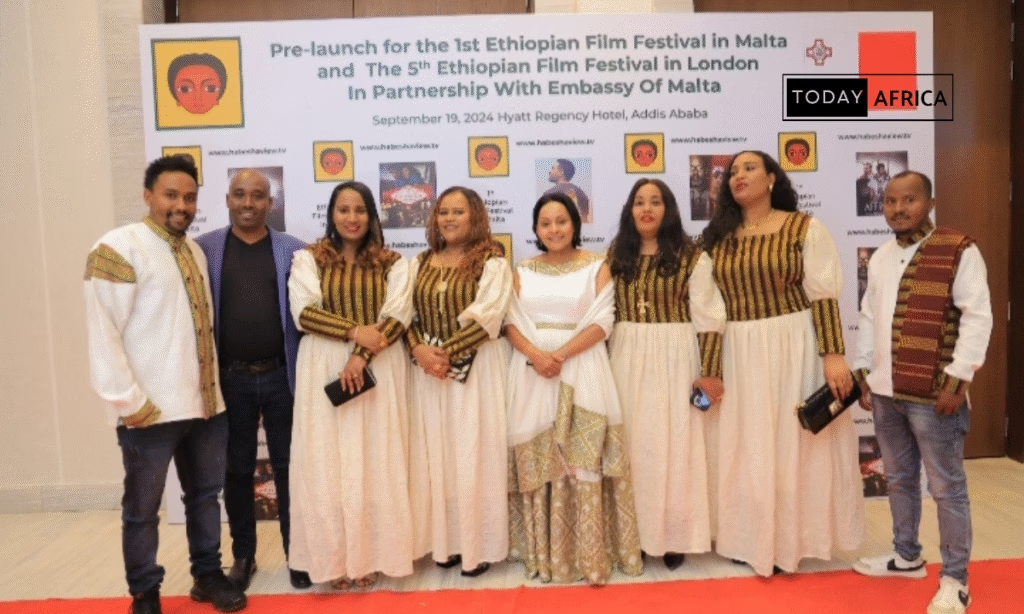
“It makes people want to visit, invest, or learn about our culture.”
She’s particular about originality. “We’re not interested in translations or copies of other countries’ films,” she says. “We want something original because we have enough stories to tell.”
And audiences are responding. “At our London festival, about 30% of attendees are non-Ethiopian,” she says. “They come in curious, and leave converted, with a positive image of the country.”
What’s one misconception about Ethiopia that habeshaview is trying to change?
Tigist doesn’t hesitate when asked this question.
“If I go back 40 years,” she says, “everybody saw the BBC documentary and Bob Geldof’s song. That’s what people remember.”
For her, the biggest misconception is that Ethiopia, and Africa more broadly, hasn’t grown.
“Some people still think we don’t have beautiful buildings, coffee shops, or five-star hotels,” she says. “They have no idea how much we’ve changed.”
Through habeshaview, Tigist wants the world to see the other side: an educated, dynamic, and fast-growing Ethiopia.
“We’re not rich yet, but we’re up and coming. Things work. People are educated. Our culture is older than many nations in the world, and we have our own alphabet and ancient traditions.”
She also wants to correct another narrative: that every African dreams of leaving.
“Not everybody in Ethiopia wants to go to Europe or North America,” she says firmly. “That story the media keeps pushing, which isn’t the whole truth.”
Her solution? Let Africans tell their own stories.
“We shouldn’t let outsiders define us,” she says. “We need proper producers and investors, not donors with agendas, so we can tell our stories in our own words, in our own time.”
See Also – How Amina Asu-Beks is Changing the Way Nigerians Shop
What were the marketing strategies you used to attract users to the platform?
“The beginning was all word of mouth,” Tigist laughs. “We wanted to watch Ethiopian content, our friends wanted to watch, our children wanted to watch us.”
Because habeshaview was free at first, people came naturally. Later, as they improved the app and opened offices in Ethiopia, the U.S., and London, they began experimenting with small-scale marketing.
“We started slow,” she explains. “We wanted to test the app and understand the market.”
They leaned heavily on community networks and local promoters, what Tigist calls “guerrilla marketing.”
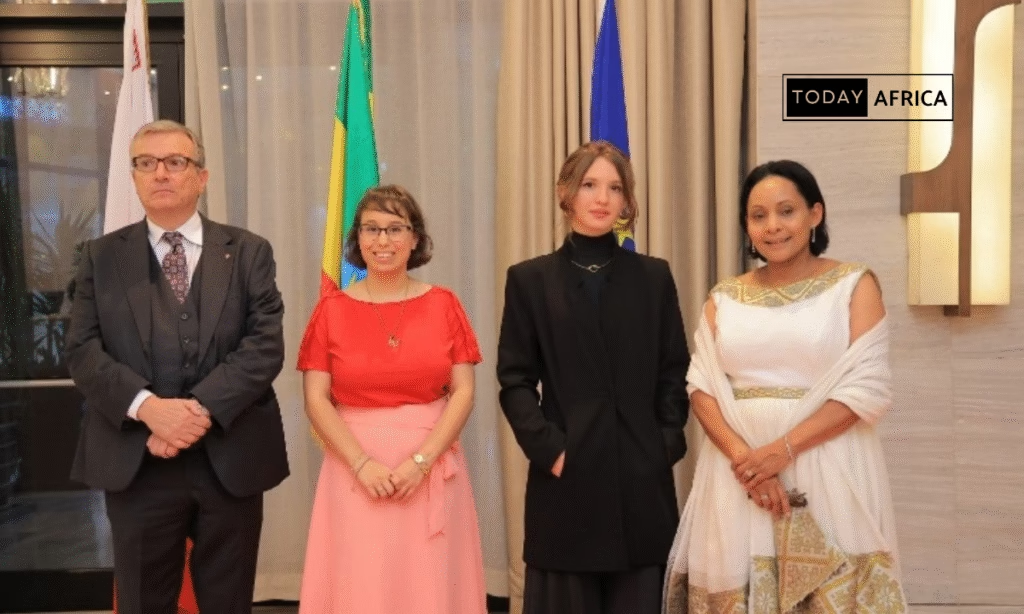
Festivals and film premieres became their biggest promotional tools.
“When we host a premiere or a festival, it becomes the place to be,” she says. “In London last year, over a thousand people attended in just three days.”
As trust grew, so did recognition. “Now, when people think of Ethiopian film, they think of habeshaview,” she says proudly. “The name stands out, and our consistency over ten years has built confidence among both viewers and filmmakers.”
Where do you see habeshaview in the next 5 years?
Tigist’s eyes light up when she talks about the future. “Technology keeps evolving,” she says, “so we’re constantly updating and improving.”
In five years, she envisions habeshaview producing major films in Ethiopia and collaborating with international filmmakers to take Ethiopian stories to the global stage.
“We want to see our films shortlisted and winning awards,” she says.
Her dream isn’t to compete with cinemas but to complement them.
“We support cinemas,” she insists. “Films should have theatrical releases before streaming, it helps the whole ecosystem.”
Still, she’s realistic about piracy, one of the platform’s biggest threats.
“People think sharing a pirated film is harmless. It’s not, it’s theft,” she says sharply. “We’re working hard behind the scenes to protect African filmmakers.”
For Tigist, the next five years are about growth, quality, and integrity.
“We’ve built the foundation,” she says. “Now it’s time to reach for the skies.”
What lesson have you learned in your journey as an entrepreneur?
Tigist smiles knowingly. “At first, I made decisions with my heart instead of my head,” she admits. “That’s not sustainable.”
She’s learned to separate passion from business.
“Someone might pitch a great idea with enthusiasm, but if they can’t deliver or manage the budget, it fails. I’ve learned to say no more often.”
Trust has also been a tough lesson. “Not every advisor has your best interests at heart,” she says quietly. “That realization was painful.”
Still, she remains open and transparent.
“You learn to listen, to filter advice, and to protect your vision,” she says. “That’s the real education entrepreneurship gives you.”
Tell us more about your collaboration with Afro Film Alliance
“Our goal with Afro Film Alliance is to bring African cinema into the international spotlight,” Tigist explains.
The partnership began last year with a pilot workshop for Ethiopian filmmakers, including panel discussions and short film screenings.
“This year, we’re scaling it up,” she says. “From November 5th to 10th, we’re hosting workshops on budgeting, production, and scriptwriting, followed by a red-carpet screening of ten selected short films.”
Submissions are open to African and diaspora filmmakers, with one winner receiving an all-expenses-paid trip to Ethiopia next year.
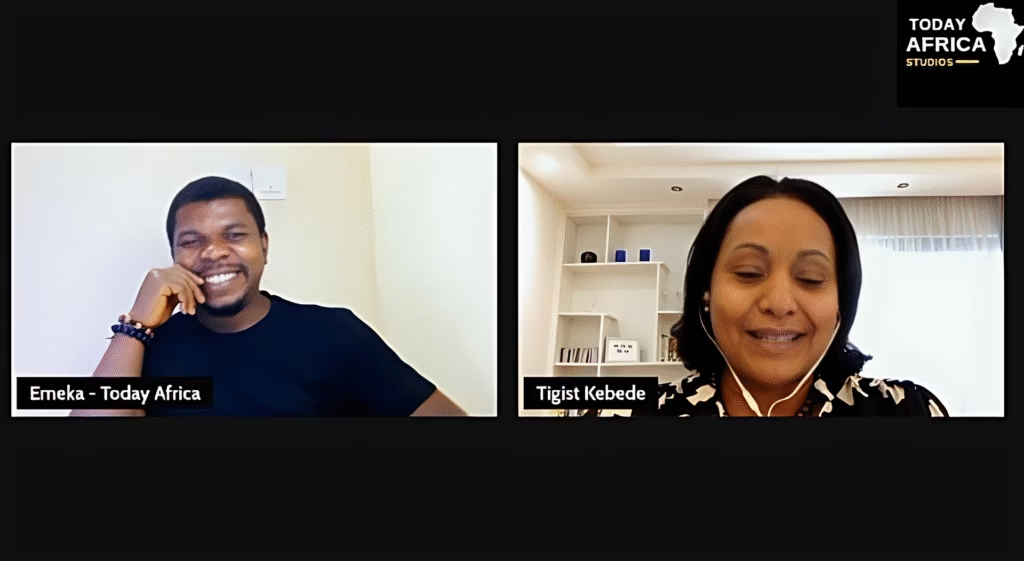
“It’s part of a bigger plan,” Tigist adds. “We have the Ethiopian Film Festival in London, Afro Film Alliance in Addis, and Malta Film Festival in December. It’s exhausting, but so rewarding.”
Her hope is clear: “We want to create platforms that unite African filmmakers and showcase their creativity on the global stage.”
Read Also – Why Sarah Olagoke Believes Women’s Health is the Key to Community Growth
What advice would you give to others, especially women?
“Do your research, yourself,” Tigist says emphatically. “Don’t rely on hearsay.”
She encourages aspiring entrepreneurs to talk to people in their field and ask questions, no matter how basic. “I’ve met many women who hesitate to speak up,” she says. “But if you don’t ask, you don’t learn.”
Her advice for pitching is equally practical: “Always assume the person you’re talking to knows nothing about your business. Explain it clearly, with confidence.”
Most importantly, she says, “Be honest, be transparent, and stay prepared. Opportunities come to those who do the groundwork.”
Contact or follow Tigist Kebede:
Leave a comment and follow us on social media for more tips:
- Facebook: Today Africa
- Instagram: Today Africa
- Twitter: Today Africa
- LinkedIn: Today Africa
- YouTube: Today Africa Studio

